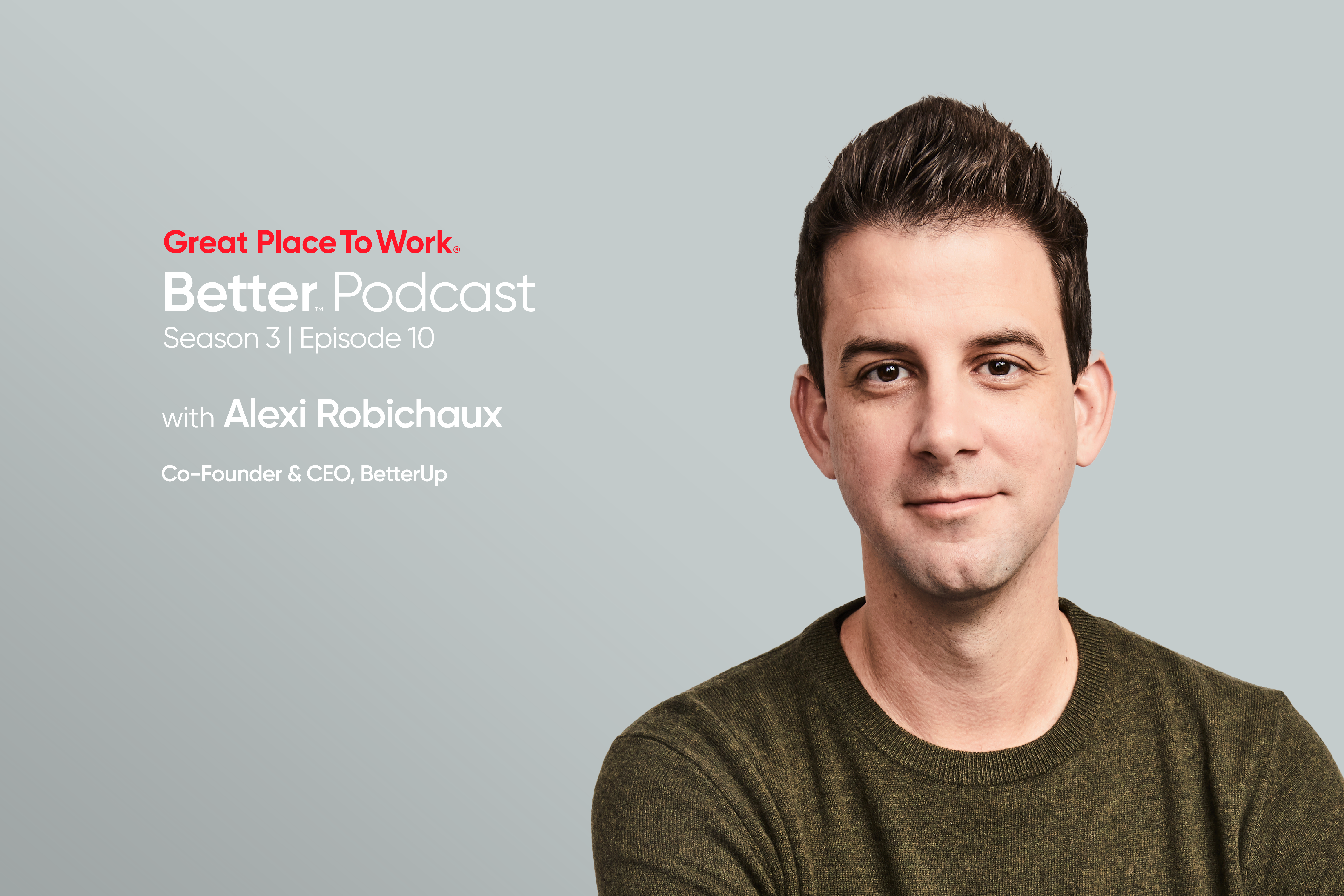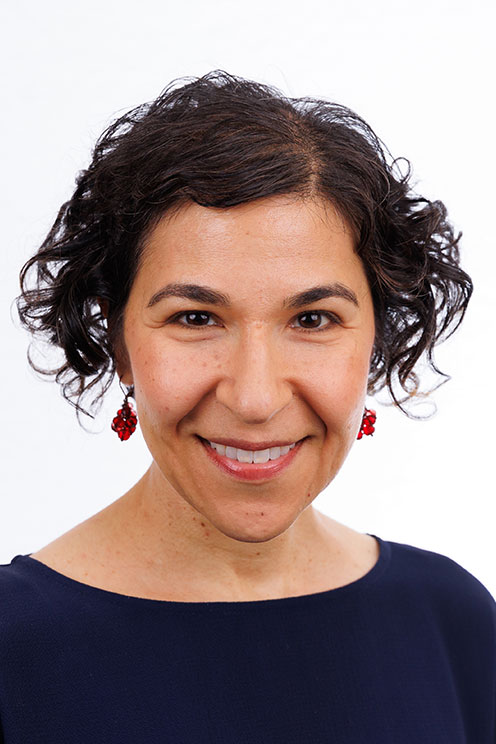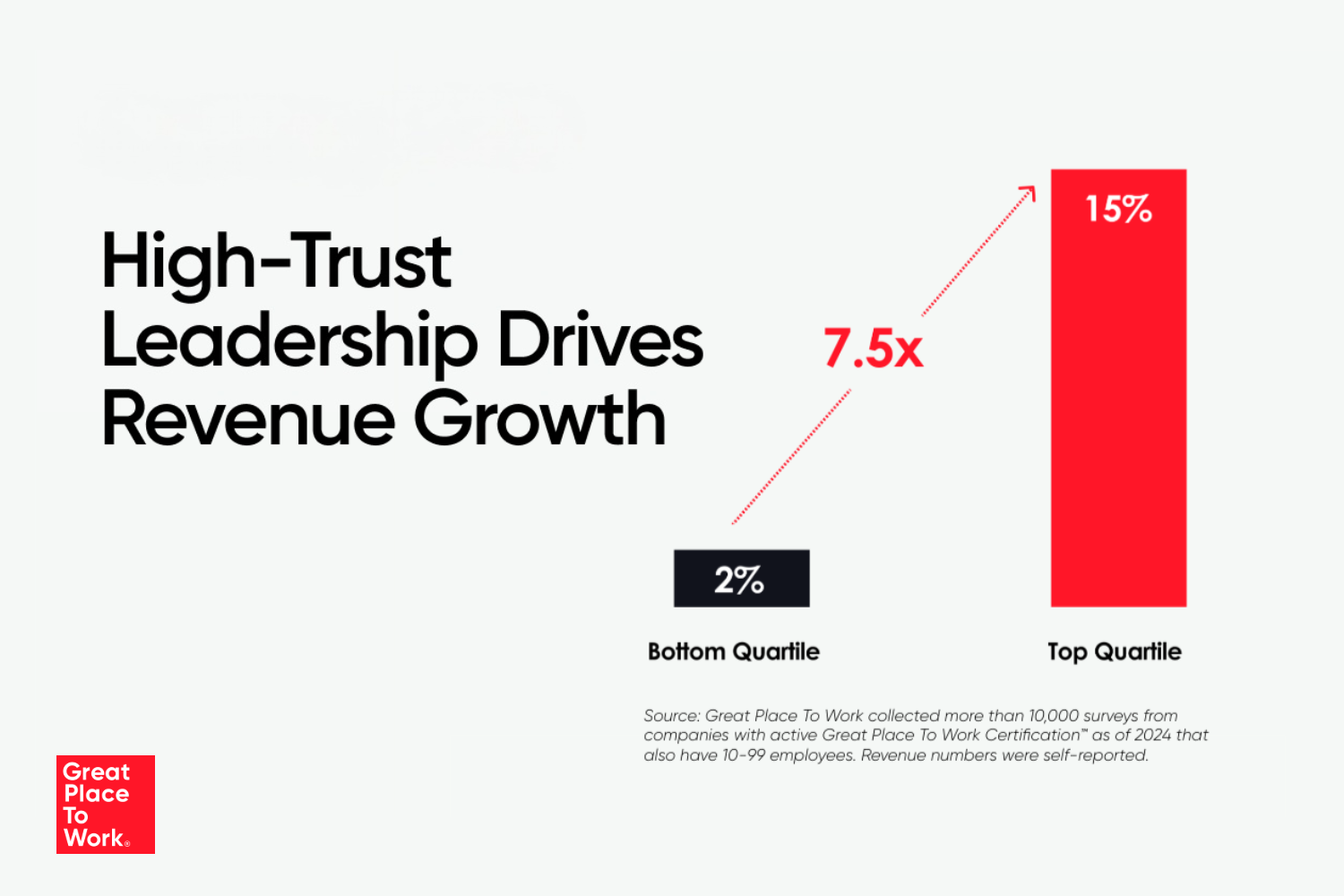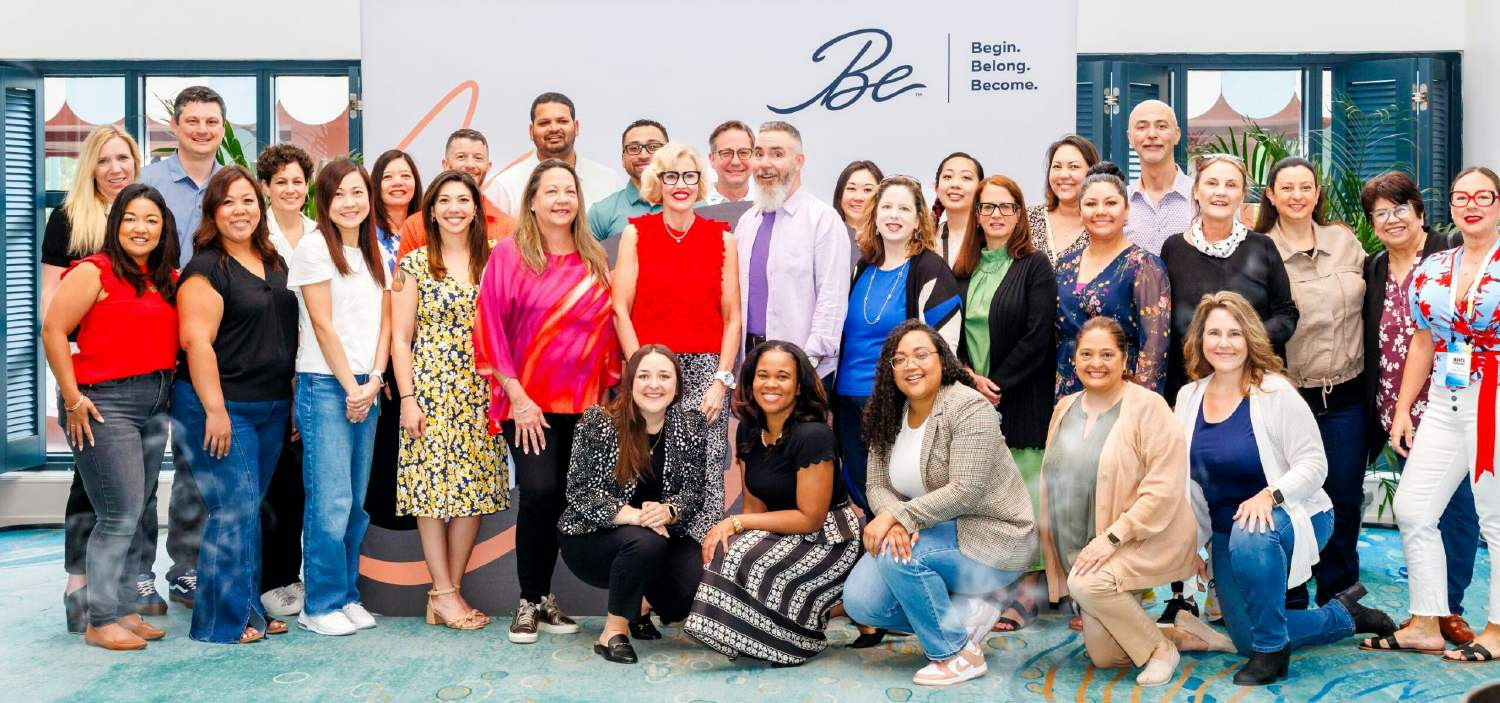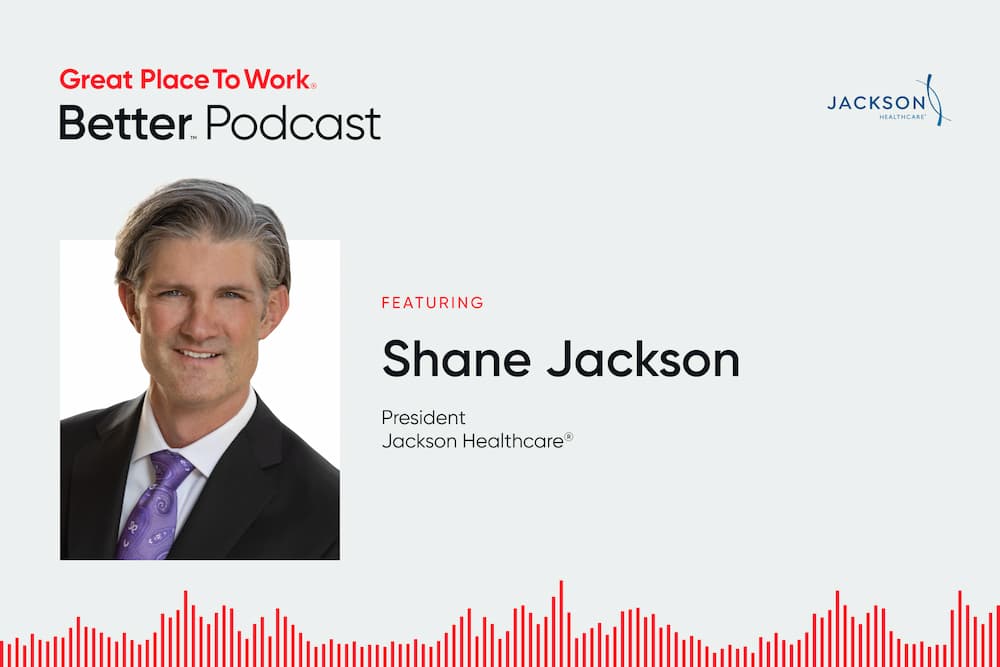Best Workplaces, Celebrating, Employee Experience, Employee Recognition, Purpose, Thanking
“Recognition is the most powerful driver of discretionary energy and effort.”
On this episode of the Better podcast, Alexi Robichaux, co-founder and CEO of BetterUp, talks about the power of inner work, the most powerful way to recognize your people, and the connection between meaningful work and giving extra at work.
He shares why we should stop thinking of managers as supervisors and more as catalytic converters, and the three jobs everyone at BetterUp has. (Hint: the job they’re hired for is the last on the priority list.)
On the importance of special recognition:
Employee recognition is the most powerful driver of discretionary energy and effort.The most powerful thing I've seen is what functional leaders have done by sending out weekly emails, recognizing some of the best work in their departments.
It recognizes that employee, and for everyone else, it's vicarious learning and role modeling.
The job to be done as a CEO isn’t to delegate this because you need to do it at these symbolic levels. How do you inculcate a culture and model where you have functional leaders when you're not even thinking about it doing it?
I get copied on emails all the time from functional leaders where they're celebrating an employee and they copy me on it. And it's a one sentence reply. "Amazing. This is awesome. Congratulations." Now their functional leader has it. They've copied the CEO or my co-founder Eddie, and they're getting that.
That's cheap, that's fast, but that's powerful. And the cheapness doesn't demean that it's the salt of life. This is the zest that makes people want to come to work every day and makes them feel as they should –
like their contributions matter.
On inner work:
It’s a contrarian thesis that by doing less, people will be more focused — they'll prioritize better, centralize better, and create more creative outputs. We’ve found that to be tremendously true.I talk with a lot of leaders and you'd be surprised how few meetings they have. They’re doing inner work, whether they call it that or not. They're strategizing, they're doing white space sessions, they're
defragging their hard drives of their mind. They're making big decisions.
It's not idle time. You're working. You're just not working outside of yourself, you're working inside of yourself. When you've nailed that inner game, the outer game is so much easier.
So, we don't just pay you for the outer work where the output shows up. We, to be fair, want to pay you for the inner work.
People do that with nature walks, meditation, or just by doing things that really help them get in the zone and think and really gel with their values. Whatever the case may be, inner work is about optimizing your inner game, which of course shows up in a better outer game over time.
On what makes work meaningful to people:
We found that work was the most meaningful for people when work felt like it contributed to their growth and development. Then we looked at how management can play a role. We found the the single most important thing management can do is simply communicate to people that is important to you that their work is meaningful. Telling people, "Hey, it's really important that your work matters” makes work matter more.It's not a slight of hand because you have to be genuine about it, but it's deceptively simple.
It has to start with senior leaders connecting what you're doing to the mission of the company, and how that is improving society and how that is improving people's lives. It starts with senior leaders and it
needs to go down to the management level to permeate on a day-to-day basis and persist.
On how the Camino de Santiago trail in Spain influenced his career:
I often joke my journey to BetterUp started when I was 17. On night and weekends, while I was a young overwhelmed, burning-myself-out-executive in Silicon Valley, I was still volunteering with a nonprofit that I helped start in high school called Youth Leadership America where we did after school peer-to-peer based mentorship and coaching on leadership and life skills for high school students.
What happened as I took the time off is I returned to my true north, which was helping people build meaningful lives and helping them grow and develop. I walked across most of Spain and I returned to my true north, which was helping people realize their potential. That was the genesis of BetterUp.
Listen to all episodes
Subscribe to Better wherever podcasts are available so you don't miss an episode of season three.
Get more insights
Learn more strategies from our workplace culture experts at our For All™ Summit, April 8-10, 2025 in Las Vegas, NV.
Roula Amire:
Welcome to Better by Great Place To Work, the global authority on workplace culture. I'm your host, Roula Amire, content director at Great Place To Work. Alexi Robichaux, co-founder and CEO of BetterUp, joins me on today's episode, and I know it's going to make you rethink a few things.We covered a lot today from the power of recognition and mattering at work to the importance of inner work days and the three jobs everyone at Better has. But what stuck with me is why we should stop thinking of management as supervisors and more as catalytic converters.You're also going to hear about the Camino de Santiago Trail, which is a pilgrimage across Spain and how that experience influenced Alexi's approach to culture.
Alexi, welcome to the podcast.
Alexi Robichaux:
Thanks for having me.
Roula Amire:
Is Alexi short for Alexander? Is that your given name?
Alexi Robichaux:
No, my given name is Alexi.
Roula Amire:
Alexi. And you're Greek. Is your...
Alexi Robichaux:
Yep, my mom is from Greece. I'm a dual citizen, yep. My dad is from the bayous of Louisiana, hence the last name.
Roula Amire:
I'm asking because I'm Middle Eastern, so I'm-
Alexi Robichaux:
Oh, okay.
Roula Amire:
I'm sure dinner tables look very similar growing up. We had-
Alexi Robichaux:
Lovely, yeah,
Roula Amire:
... the feta cheese and the olives and grape leaves and all that good stuff.
Alexi Robichaux:
Of course.
Roula Amire:
So we're going to spend our time today talking about the culture you've built. But before we do that, I wanted to set the stage a little bit. So Alexi, you're the CEO of BetterUp, a mental health and professional virtual coaching platform startup, which I believe is the largest in the world.
Roula Amire:
You co-founded 10 years ago, you've been named to Forbes inaugural list of the 50 people changing the future of work, and you're Prince Harry's boss. You hired him as Chief Impact Officer in March 2021. All very impressive, but there was a period of time when life looked very different. You were in your 20s, you were working in Silicon Valley, not having a great experience. So you walked away from it all, did some soul-searching. If the internet is to be believed, you got therapy, you read books, you got coaching, you went on a pilgrimage to Spain, the infamous pilgrimage which I'm actually curious about, all in search of answers. And those answers led to you to where you are today. So just starting from there, how did stepping away from work lead you to create BetterUp and generally speaking shape your approach to company culture?
Alexi Robichaux:
Well, thank you for doing the interest in that research. In this case, the internet is actually accurate. It was interesting. I think for me, my journey to BetterUp, I often joke started when I was 17. In the background, while I was a young overwhelmed, burning myself out executive in Silicon Valley, nights and weekends, I was still volunteering with a nonprofit that I had helped start in high school called Youth Leadership America, where we actually did after school peer-to-peer based mentorship and coaching on leadership and life skills for high school students. And that was a big passion of mine since I had been 17 and started that with some buddies. My friend John Wynn had the idea and was the original founder and pulled some of us in.
What happened as I took the time off is I kind of returned to my true north, which was helping people build meaningful lives and helping them grow and develop. And it had always been there and I just never thought it could be my job. It was like, "Well, I need a real career. I have to go get a job. I just do this for fun and volunteer." And Eddie, my now co-founder of BetterUp, was volunteering nights and weekends with me coaching these inner city students in San Jose and Oakland in the Bay Area. And then we had other chapters in Orange County. And so I think the simplest way is to say when I stepped out of work, I really did. I literally walked away. I walked across most of Spain and I returned to my true north, which was, hey, what really energizes me, what really gives me a sense of meaning, what really makes me fired up is helping people realize their potential.
That was the genesis of BetterUp. How could I do that in a way, what we're doing for these kids, but in a grownup way, a more scalable way and a way that was more digitally enabled so that you could be anywhere in the world and get the help you need. And so in a way, I was just designing for myself as a young executive. This is what I wanted. It wasn't quite therapy, it wasn't quite executive coaching. And I was also fortunate that it was really in one vein the same work I had been doing for at that point in my life already about a decade.
Roula Amire:
So let's talk about your culture there at BetterUp a bit. Your experience with Inner Work certainly shows up in your culture. You give employees for Inner Work days a year. So can you define Inner Work days, why they're a priority and the impact?
Alexi Robichaux:
We talked about my lineage from Greece, you being from the Middle East, you go back to any ancient tradition, there's always space created to do nothing, whether it's meditation, whether it's contemplated prayer. We somewhat lost that in modernity. And so the idea with Inner Work is how do we help structure and guide people into more introspection in a positive way, more reflection, more contemplation about what's most important in their life and work. And it's a contrarian thesis that actually by doing less, then people will be more focused, they'll prioritize better, they'll centralize better, and they'll actually create more creative outputs. And what we found is it's been tremendously true.
And so I get to talk to a lot of CHROs, a lot of CEOs in my role of the world's largest companies, mainly Fortune 1000s. The best CEOs, you'd be surprised how little meetings they have. People have been saying this since Peter Drucker, "Well, what are they doing all day?" They're doing inner work, whether they call it that or not. They're strategizing, they're doing white space sessions, they're defragging their hard drives of their mind. They're making big decisions. They're not busy, but actually they're still doing work. And so that's what we tried to capture with Inner Work. It's not that it's like idle time. You're working. You're just not working outside of yourself, you're working inside of your yourself. But then when you've nailed that inner game, the outer game is so much easier. And we spend so much time phonetically focused on the outer game in modern society that we forget some of the fundamentals of being a human and connecting with yourself.
And so we decided, Eddie and I, that as an employer, we wanted to take a stand and say, "You know what? We pay you for all that work. We don't just pay you for the outer work where the output shows up. We actually, to be fair, want to pay you for the inner work." We hope all our employees do that. We also realize it's new to a lot of people. And so we design these days where nothing happens at the company externally. It's inner workday. And so they're not days off from work. They're days to go work on yourself. And people do that with nature walks. People do that with meditation. Some people do that just by doing things that really help them get in the zone and think and really gel with their values. But whatever the case may be, Inner Work is about optimizing your inner game, which of course shows up in a better outer game over time.
Roula Amire:
Mm-hmm. How would you persuade a fellow leader who isn't convinced inner work days will help the company in a tangible way in the bottom line? So they might hear what you're saying and understand, "Oh sure, if you improve your life outside of work, that will help you at work." But how does it actually show up at BetterUp in terms of innovation, ideas, wellbeing, those bottom line results?
Alexi Robichaux:
Let's just work backwards. Where do you compete? You compete in breakthroughs, innovations, ideas. Okay, well what scientifically are the conditions for good creativity, good ideas? We know this isn't we're calling a neuroscientist. This isn't like a mystery anymore. It's like, "Yeah, people are more creative when they're not stressed out. Turns out people are more creative when they have time to think. People are more creative when they don't have marital issues bleeding into the workplace because they have time to focus on them." Okay, so you can just start to unpack this. Is the inner workday as an item the way to achieve that? I'm not here to be the apostle of inner workdays. I will definitely promote inner work however you want to do that, right? And I would just say I find senior leaders actually get this. When they reflect on their own productivity, they're like, "Yeah, you're right. When I didn't go to meetings for two days and really answer that big strategic question, that unlocked a lot of energy in my business and a lot of performance."
Roula Amire:
So I'm curious what you do in terms of special recognition for employees. So we just completed a study of more than 700,000 workers looked at the correlation between wellbeing and giving extra at work, what we call discretionary effort. And nearly everyone and 94% of people who say they're experiencing high levels of wellbeing describe their culture as a company where people give extra to get the job done. So then we look further and we said, "Okay, well what drives people to give extra?" And a top driver is special recognition. So employees feel that everyone has equal opportunity to get special recognition. They are 120%. So 2.2 times more likely to say, "People give extra here." And that speaks to being seen and recognized for good work. What is an effective way or some ways that you recognize your people at BetterUp and what would you say to leaders who don't make recognition a priority? Because many don't. They think, "Oh, people, they know how we feel. They know they're important," but special recognition needs to be shown and told.
Alexi Robichaux:
Yeah, I think that that's a really cool finding to be able to quantify that by the way. I think conceptually, that corroborates decades of research. More recently, behavioral economics research. I think you said it, and I'll talk about what we do as a super system, but honestly where this lives is at the manager level and at the team level, right? It's like recognition is the most powerful driver of discretionary energy and effort as you just shared, it's also the cheapest.
So if a leader isn't doing it, generally there's one of two things I have to believe. One, they just don't know how. I think this is pretty common because sadly they didn't have that role modeled in their own career. And so that's a coaching opportunity to teach and role model that. I can talk about how we do that. Or two, there's actually just an ego block there, which is decently is like, "I didn't get this. You need to just pull yourself up by your bootstraps." Okay, that's just kind of ego. It's not about you. It's not about when you were 20. It's like, "This is the world we live in now. This is what works. Let's be pragmatists here."
What we do is we have company level stuff. We do cultural value rewards twice a year. So we actually recognize employees who are modeling and it's based on peer selection, leaders help manage the process, who are luminaries of our values and are really bringing that to life. They earn cool trips. Like pre COVID, where we start in this, I take 10 employees a year on the Camino de Santiago for two weeks in Spain. Eddie's from Peru. He takes people on the Inca trail. And so you get these cool... We call them BetterUp adventures. You get access to that. You could have a spa day, things for inner work. There's a lot we try to do to recognize that. We do discretionary spot bonuses for really good projects and work. So there's things like that.
We highlight it all hands. We just did this. We just were highlighting deals and the teams that supported the deals and new customer partnerships. Some we highlighted that hadn't even closed yet because the ground game was just so good, we wanted to communicate it's not just about the, "Oh, right, you closed the deal." It's actually about, "You have a winning ground game. I kind of don't care if this deal closes or wins because probabilistically, if you keep playing this way, we're going to close a lot of deals. We're going to have a lot of new friends and new customers and more people's lives being positively impacted by our mission."
So we have those structural things. But the most powerful thing I've seen is actually not what Eddie or I do in these all hands or things like that, it's one layer down what functional leaders have done in creating a culture of sending out weekly emails, recognizing some of the best work in their departments. And they just send this out to their distribution lists like, "Hey, it's Friday and it's basically every Friday, we have leaders who are praising employees. Not randomly, but this was a deck. Samantha, it was amazing. Here's why." So it does two things. One, it recognizes that employee. But I think the under leverage side of recognition is recognition to the employee being recognized is recognition. To everyone else, it's vicarious learning and role modeling. And so that's when it's really well-designed.
And so I think the job to be done as a CEO is how do you not delegate this because you need to do it at these symbolic kind of company level things, but how do you inculcate a culture and model where you have functional leaders when you're not even thinking about it doing it? And I get it. I get copied on emails all the time from functional leaders where they're celebrating an employee and they just copied me on it. And it's like a one sentence reply. "Amazing. Oh, geez. This is awesome. Congratulations." Okay, so now their functional leader has it. They've copied the CEO or Eddie, the co-founder, and they're getting that. That's cheap, that's fast, but that's powerful. And the cheapness doesn't demean that it's the salt of life. This is the zest that makes people want to come to work every day and makes them feel as they should like their contributions matter.
Roula Amire:
It's nice that we can quantify it because also leaders are looking for those numbers. They want their people to be productive and go above and beyond, but they're often missing, well, what's going to help them get there?
Alexi Robichaux:
Totally. It's amazing how ROI-driven leaders become when it comes to recognizing people. We'll spend a ton of money on a marketing campaign with no measurement, but it's like, "Oh, I really need a business case to know I should send someone a thank you email. It's like, "Okay, let's just all wink wink. We'll pretend that's why." But it's like you'll spend millions of dollars on things that have like, "Well, that wasn't even close to a business case. You just spent the money." And that's in any business. Yet on something that is essentially free, it's like, "Well, I'm not sure it's worth my time." It's like, well, we're talking 10 seconds, so I guarantee your ROI is in the tens of thousands of percentages.
Roula Amire:
Yes. Yes. So let's talk about a mattering at work. It's a phrase you shared at Davos this year based on BetterUp research that showed 70% of workers want to know their work matters. And when they feel it does, they're more likely to stay at their job. Mattering is also one of the recommendations from the surgeon general just recently and how to create a sense of wellbeing for workers. I believe he even used that term. Maybe he heard it from you. We don't know.
Alexi Robichaux:
He may or may not have. He may or may not have, yeah.
Roula Amire:
Our research shows the same thing. Meaningful work, meaning that your work is not "just a job" is the biggest retention driver across demographics, industries and geography. But going one step further, Harvard Business School, using our data at Great Place To Work, found that companies where employees felt a sense of purpose at work and believed their leaders set a clear direction and expectation, so purpose plus clarity, those companies outperformed the stock market by nearly 7% and their returns were even bigger when middle managers and individual contributors experience purpose and clarity. And it's not on the employees to find purpose or make it clear. That's on the managers. As you just said, that's on leaders. So how do you help create a sense of purpose for your people at BetterUp and help managers provide that clarity to employees?
Alexi Robichaux:
It's so true. And thanks for reading the research, both meaning and mattering, which they're they're cousin concepts, but there is some nuance and difference there. What we found is we dug in our own data and said, Okay, what you found is similar, which is good. More research corroborates. Again, not kind of rocket science. When people feel work is important, that means they're going to care more. Okay, great. We kind of get that. What we asked is, "Well, what makes work meaningful for people?" Because this is really the crux of it. "Can I make work meaningful for you?" And the strict answer is no. Meaning is a subjectively mediated construct. It's very personal. It gets back to inner work, your values.
But what we found is work was the most meaningful for people. The single biggest driver was when work felt like it contributed to their own growth and development. And this is huge, right? We're all kind of selfish, not in a bad way here, but it makes sense. "You pay me, I want something from this. You get something from this. This is good. This is actually how it should work in a good clean economy," right? We both win. We're both winning. Okay?
The second thing we looked at is like, "Well, how can management play a role in that?" And what we found is the single most important thing from management and making work meaningful, is simply communicating to people that is important to you that their work is meaningful. It was just kind of like, "What?" Jaw-dropping obvious thing of, to your point, management just telling people, "Hey, it's really important that your work matters to you. We want to make that." That itself makes work matter more. It's not a slight of hand because you have to be genuine about it, but it's deceptively simple.
So this I think really starts with senior leaders and it needs to go down to the management level to permeate on a day-to-day basis and persist. But it starts with senior leaders connecting what you're doing to the mission of the company and how that is improving society and how that is improving people's lives. And this gets into the mattering work. Mattering has different dimensions. There's "I matter. What do I matter to though?" There's a reciprocity to mattering. "I have to matter to someone else. Do I matter to my coworkers? Do I matter to my family? Do I matter to society? Do I matter to God or whatever higher being I believe in?"
In the workplace, you really can connect to the coworkers, the society deeply. And so that is the job of senior leaders, to paint that. And so how we do this at BetterUp is we're all about this. Our strategy is always a mission to metrics cascade. "Here's our mission. Here's how we believe we instantiate that mission over the next few years. Here's how this year's strategies delivers on that. Here's how your functions ladder up to that."
But a cool tool, one of our researchers, Gabriela Kellerman, who is our chief innovation officer, designed with Martin Seligman, they wrote this amazing book together called Tomorrowmind, which is based on all BetterUp's data. What are the real meta skills that matter in the economy of the future? They came up with this tool called Mattering Maps, which is, it almost looks like a little solar system. We take all of our leaders in our employees through this, which is like, "Here's you. What are your personal values? You draw them out. What are the teams you contribute and support in the business system? What are the outcomes that creates in our ecosystems for customers?" And it's a very visual, easy way for someone to say, "Hey, I may be a ticket taker. I'm a customers support agent. I take tickets all away." That's not actually what you do. What you actually do is you bring empathy, zest, and playfulness to people every day when they're having tough problems.
And you do that by partnering with our sales team, our support team, our engineer team. And by doing that, what you actually do is you make customers lives easier. You allow more people to have the life-changing experience in BetterUp. Okay, you have just helped someone connect deeply that seemingly benign wrote task of answering a Zendesk support ticket. You've now, as a leader, helped catalyze meaning around that and say, "You're actually not doing that." It is back to the old janitor at NASA, 'I'm putting people on the moon.' You are putting people on the moon. Someone has to sweep the floors."
And that is what we found. When we studied workers and we looked at everything from literal janitors to knowledge workers to everything, the people who could connect how the tasks they do contribute to bigger human outcomes were the happiest, the most fulfilled, and the top performing people. And so our jobs as managers is to literally connect the dots. Whether it's through your mission to metrics, whether it's through a tool like mattering maps, these are all tools. The real answer to this is management. The way you connect the dots is the reason middle management exists. We should stop thinking of middle management as supervisory work. It's catalytic converters that help convert context to meaning for people. That's the job of management in this modern century. And we'll probably have a bunch of AI supervise different aspects of jobs, but what the manager becomes is a really powerful storyteller on connecting why this matters, why you matter, how this contributes to your personal journey, how this contributes to the company's journey. That's the job of the manager in this century.
Roula Amire:
And when they do that well, as you said, the employees, they're happier, they're more productive. There's the ripple effect of all goodness that comes from understanding their purpose and the role and why they matter. And then you see it in stock prices. You see it in the bottom line. You're outperforming your competition. It's this cyclical cycle. You help them, they'll help you. They feel they matter. You show them that they matter.
Alexi Robichaux:
There's really no downside. It's kind of hard to argue against. If you're a skeptic, you may say, "Well, I don't know that it's going to do all of that." Okay, well, if it does 5% of that, it's better than the status quo. But my counter argument is like, what do you have to lose? Worst case, you've just enabled your managers to provide more clarity and more focused direction. I think we can all agree that's just good. Does it scratch this existential itch? Maybe you don't believe the surgeon general, but the data's there. Wellbeing moves with mattering. That's why it's included in his framework. And the data's there to your studies, to some new studies that come out. Wellbeing tracks pretty well to stock prices and top performing organizations. And so do you have to believe the most grandiose version of this? No. If you just believe, "If my people have more clear priorities and more focus, they will be better at their jobs," you should still do this.
Roula Amire:
So something that intrigued me while I was doing my research was your description of the three jobs every employee at BetterUp has. So you have, one, extreme owner, meaning you're vested in the company's success. Two, you're a citizen of the company, which is you display the values we've just talked about. And then three, last is the role you were hired for, your actual "job." So why do you put that? And you've said if you do the last one, your job really well, but not the first two, you're probably not a fit, "Well, you're not a fit here." So why do you put so much weight on those first two jobs, so to speak?
Alexi Robichaux:
I think the simplest way to describe it is, if I can generalize, it's probably generally speaking true, but specifically not always true. Most pathologies of organizations, most I encounter when I'm coaching C-suite leaders or talking to customers, they come down to usually one thing, people forget what their job is. People start to confuse the super system and the subsystem, and they start to optimize for subsystems over the super system. That's exactly what that latticing of those jobs is encouraging people not to do. The reality is... if you're on a soccer team, football team for our international colleagues, you all have the same job, help the team win. Now you have a position, but the reality is the position changes. Sometimes the goalie has to come out of the box. If you just say, "My job's to stop goals," then you're going to help the team lose in that moment. You got to come out of the box.
But that's most of what we deal with in corporations is, "Well, my job is to hit my quota. My job is to hit my KPI." No, no, no. Your job is to help the team win to achieve the mission of the company. There's a hypothesis that we baked into this business' design that if you hit this MBO, that's how you contribute to it. But it's important to have the intellectual humility and be very candid with employees. They're not the same. The MBO may change, the role may change. What doesn't change is that your number one job is an extreme owner, to pull from Jocko in Extreme Ownership, we love that book, is to help the mission succeed. And that means we will refactor, or as the Navy used to say, "We will flex on the X to change anything in the mission dynamically to help that succeed."
And actually, that empowers employees and it helps them not be what Roger Martin would call choiceless doers, where you're just like, "The flip side of this is my job is this is my job. That's not my job. Over my pay grade, I'm a choiceless doer. I just live in this box." And so what we're trying to do with those three things is to say, "No, you live in a box called the BetterUp mission. That's what you're committed to. You all have equity. That's what you're vested in. You live in a box of our values, that's your citizenship. And your job is to not be perfect at the values. Your job is to be on the Camino, to be a pilgrim on these values, to be headed towards Santiago, whatever that is for you, and getting better at these values every day." And when you have a community of pilgrims doing that, you naturally get self-compassionate empathy because you understand how hard it is.
And thirdly, by the way, you have a day job, something you do most of your hours a day. And if you're good at it in a high growth startup, it's going to change all the time. If you're bad at it, it probably won't change. And that should be concerning to you because we're growing all the time. When you're doubling, doubling, doubling, if your job is staying constant, you're probably not growing with the business. And so it's actually been really empowering and really freeing, and it's enabled us to have a career model of more quests and tours of duty where people are excited and comfortable to try new day jobs, roles as we call them, because they have some commitment and reciprocity from the org on those first two jobs that provides that connective tissue.
Roula Amire:
How do you create a sense of wellbeing for yourself now? I know you were a coach, I believe. I don't think you're a coach anymore. Do you still get coaching?
Alexi Robichaux:
Yeah, I have two coaches actually. So I still get coaching. I work with the coach on the BetterUp platform. And I actually work with the coach who helped inspire BetterUp through my own experience. I still work with her. We're probably probably going near a decade somewhere. I'd have to go look when we first started. It's a long time. So yes, coaching is a big part of it, it's a huge part of it. Walking for me is another one. And so I have daily constitutional walks. I did one this morning for about an hour with my wife. I try to do one in the evening as well. These are really critical for me. Great book, In Praise of Walking, essentially the mind is supercharged when you walk. If you can walk by water... Blue Mind, another great book of neuroscience. Just hearing being near water is gasoline, jet propulsion fuel for the human mind.
And so walking by water is one of the... If you can do it, and not everyone can. But even if you're by a fountain in a park, it's really actually just almost medicinal in terms of what it unlocks for you. And so walking is a huge one. Coaching is a huge one. And then for me, reading is a huge one. And I'm a slow reader because I tend to daydream drift off, but that's actually kind of cathartic for me. And so I read every night before I go to bed. I have a simple rule. I do not read anything related to business or the economy or anything that could get me thinking about BetterUp. It's kind of like a spin cycle in my mind. And so I go to bed, I'm reading a Star Wars book now, I go to bed thinking about a galaxy far, far away. And I wake up thinking about a galaxy far, far away instead of immediately being in the woes, the worries, whatever the daily tribulation is of running a high growth startup.
And so more, but those would be the three big practices for me that it almost created a hygiene around it at this point.
Roula Amire:
Mm-hmm. What gets you out of bed in the morning?
Alexi Robichaux:
Lots of things. I mean, I have a one-year-old son, Noah, so he literally gets me out of bed in the morning, but he's just a joy. He's like his mother, super centered, super fun. Fun, loving, chill. Not like me. I'm a little bit of a mess. So he does. But I'm really fortunate. I literally have been doing this for 20 years in some way, shape or form. I'm mid 30s. It's like two-thirds of my life has been focused on this thing of how do you help people build meaningful lives and realize their potential through leadership and life skills and good mental health. And so for me, it's just my life's work and it's who I am as a person. That's a privilege entrepreneurs tend to have, is you get to so deeply identify with your work that it feels like an extension of yourself.
And so there's days where I don't want to get out of bed, I'm sure. But most days I, it's excitement. I'm genuinely excited about what we're doing. I feel so deeply about the impact we can make in people's lives. I just feel so darn lucky to get paid to do this. I was doing this for a decade not getting paid. There is no better job for me personally, I’m not saying that for everyone, but for me personally given what I care about. If I wasn't doing this, I’d doing the same thing in a different form. I know myself, I'm a one trick pony. So that's what gets me out of bed.
Roula Amire:
And what keeps you up at night besides Noah?
Alexi Robichaux:
Also Noah, yeah.
Roula Amire:
I knew you were going to say him.
Alexi Robichaux:
Yeah. He's a pretty good sleeper. So literally, I feel like I have some great gift. I sleep super well. I know a lot of founders, that's not the case. They're always like, "Oh, I have a..." Generally, things have to be really bad for me to wake up in cold sweats. Generally, I'm a great sleeper. I get my eight to nine hours, no problem. But figuratively speaking, what keeps me up at night is it's people. It's always people. It goes back to the work you all do. It's culture. It's, "Do I worry about scaling business processes?" Not really. I worry a lot more about who we're hiring. Are we enabling them? Are they helping contribute to the culture in positive ways? Is the culture evolving in the way we need to match the evolution of the business?
And so if I were to time code my worries and concerns, I think appropriately they're almost all about people. And not from me anymore. It's really the leaders I'm hiring, the leaders I'm coaching, the leaders I'm enabling one to two to three layers down now at scale. How am I setting them up for success? How are they showing up? Probably when I'm in a worry zone, that's probably where I'm spending most of my time.
Roula Amire:
Well, thanks, Alexi. Thanks for all your time. I learned so much and I really enjoyed the conversation.
Alexi Robichaux:
Well, likewise. Thanks for having me and keep up the good work. This is an awesome podcast.
Roula Amire:
Thanks for listening. If you enjoyed today's podcast, please leave a five-star rating, write a review, and subscribe so you don't miss an episode. You can stream this in previous episodes wherever podcasts are available.


